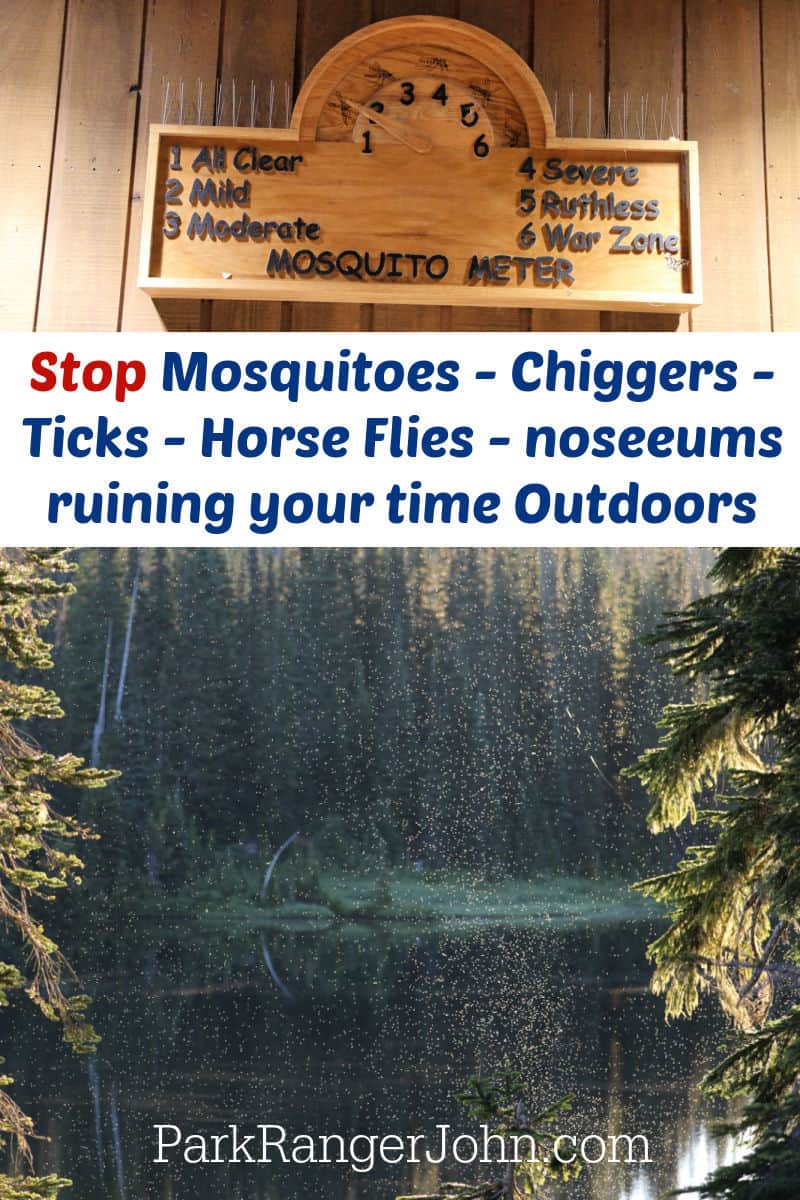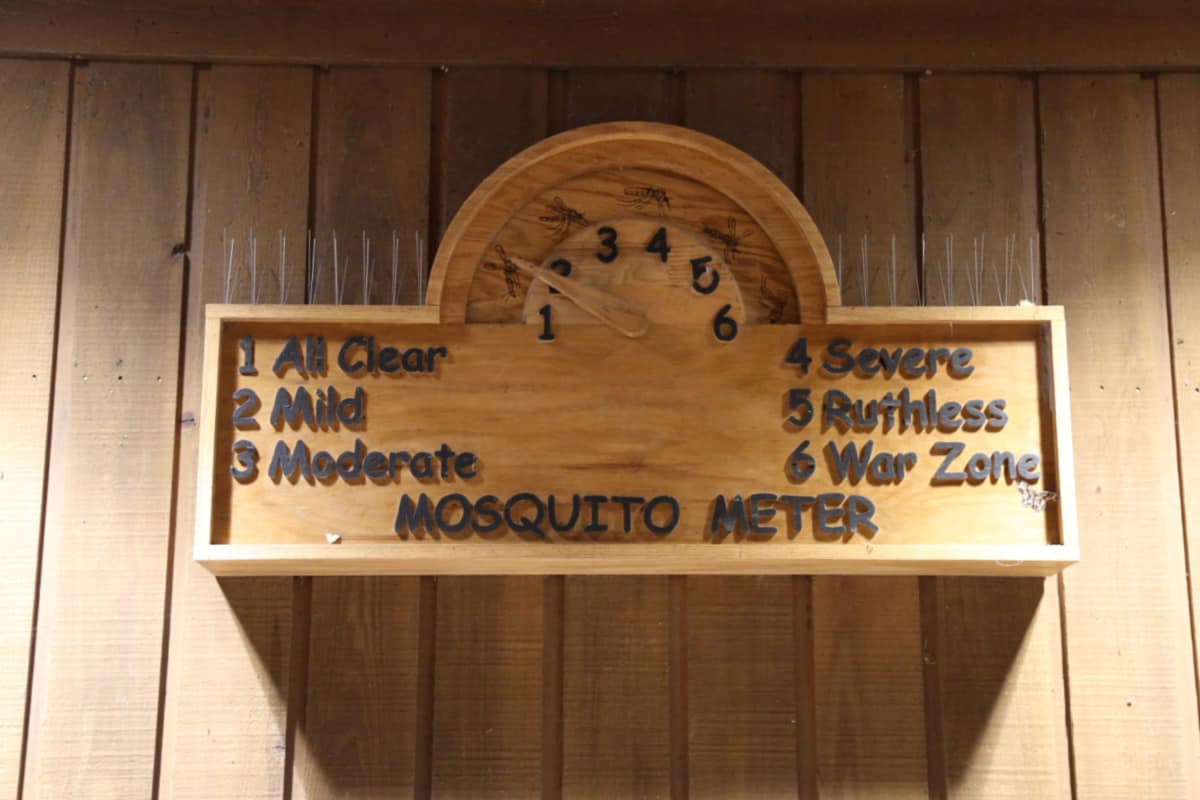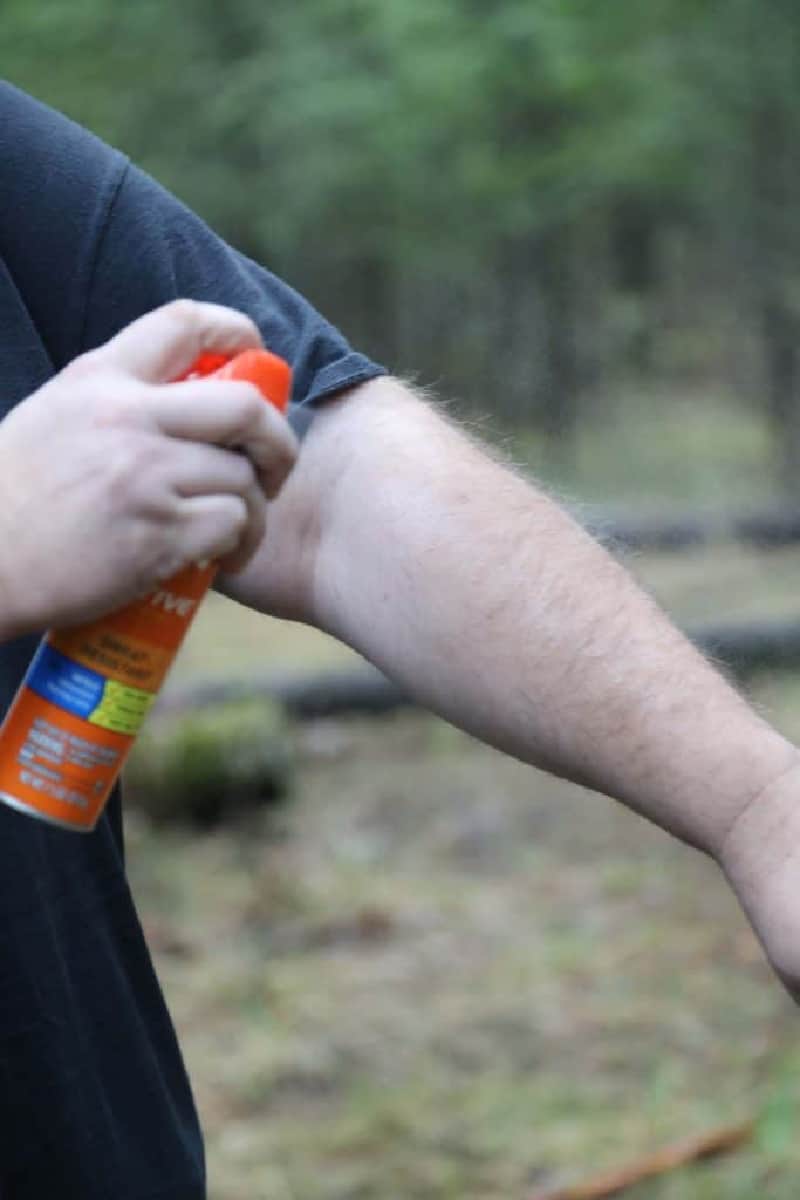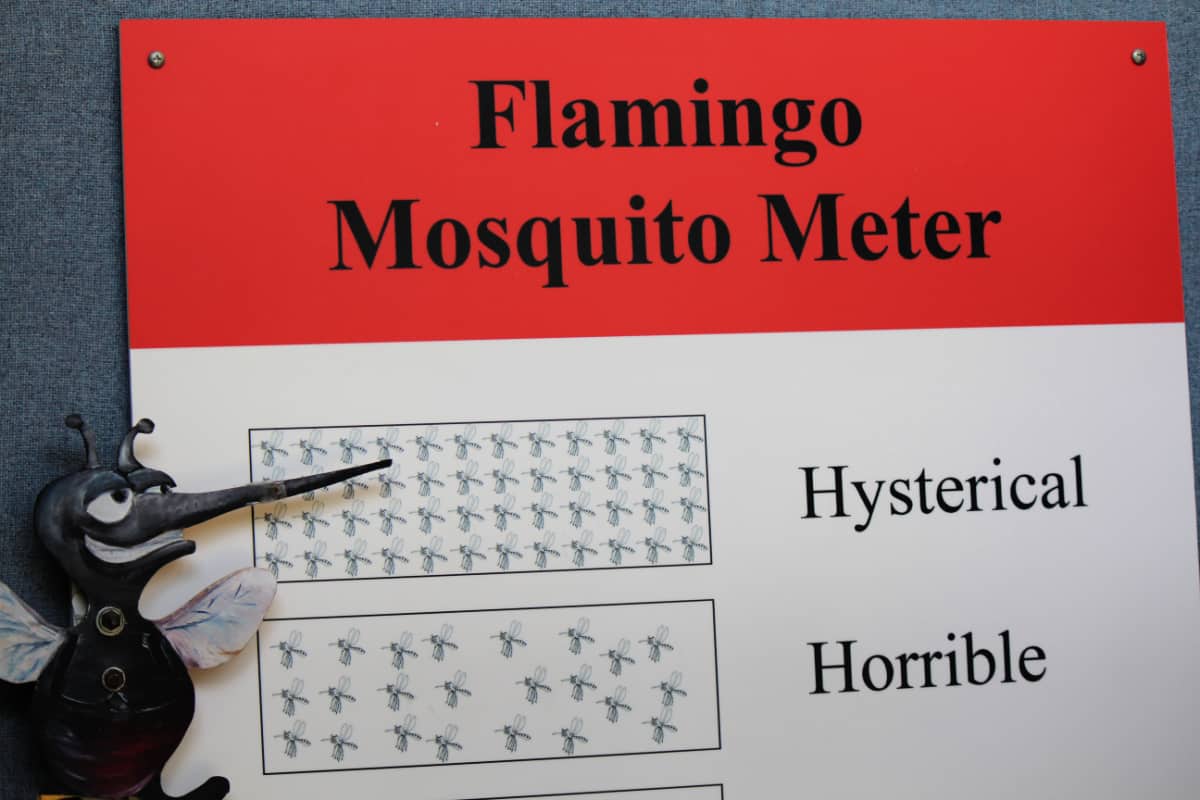Sponsored by SC Johnson
After working 20+ years in a park, I have learned some very valuable lessons on how to avoid mosquito bites while spending time outdoors.
Afterall, biting insects like mosquitoes and ticks can easily be the difference between a great day outdoors and coming home miserable and covered in bites.
Perhaps the most valuable lesson is that there is no one quick and easy trick. Listed below are several ways to help avoid mosquito bites.

How to avoid Mosquito Bites
I believe the best way to avoid biting insects is a solid defense.
For me this means using several options listed below to maximize your defense against mosquitoes.
- Understand mosquitoes and other biting insects and their habitat to avoid being bitten
- Apply insect spray with DEET
- Apply insect repellent with Picaridin
- Apply Permethrin to clothing and camping/hiking gear
- use of natural products/essential oils
- Wear proper clothing
- Insect repellent devices
- Maintain outdoor living areas
The Worlds Deadliest Animal on Earth
Did you know that worldwide, the mosquito is responsible for more than 700,000 human deaths each year?
It is estimated that there are approximately 200 species of mosquitoes inhabit the US and around 150 of those species can be vectors of the West Nile Virus.
Fortunately here in the US, only 79 deaths were reported in 2022. This does not change the importance of protecting yourself while outdoors.
In Comparison, The average deaths per year in the US:
- 20 die from lightning strikes
- 5 die from Snake Bites
- >3 die from spider bites
- 2 die from shark attacks
- >1 die from bear attacks
With some common sense and being prepared, we can avoid putting ourselves in many of these statistics.

When do mosquitoes come out
The quick answer is mosquitoes prefer temperatures above 80 degrees Fahrenheit and go into hibernation at temperatures below 50 degrees Fahrenheit.
I can, however, attest that each spring when the temperatures start to rise and people start heading to the parks, I quickly have visitors approach me practically begging me to sell them insect repellent.
It's not just mosquitoes that have people reaching for insect repellent; flies, ticks, chiggers, gnats and no-see-ums have also come out, ready to find their next victim.
Ticks
While deaths are rare when bitten, disease is much more common. The CDC records approximately 36,000 cases each year but many cases go unreported.
Here are diseases from Ticks:
- Lyme Disease
- Rocky Mountain Spotted Fever (deadliest tick borne illness) rare in the US
- Babesiosis
- Tularemia
- Heartland Virus Disease
- Southern tick-associated rash illness (STARI)
- Bourbon Virus Disease
When do ticks come out
Ticks can be out anytime the temperature is above freezing. They are however the most ACTIVE in the spring between March-May and again in the fall between August and November.
This is important to know because this is when many people love spending time outdoors.
A big part is the fact that the temperatures are much more comfortable than the extremes of winter and summer.
Other annoying pests including Horse Flies, Chiggers, No-See-Ums
Anyone ever bit by a horse fly can attest those things pack a punch! DEET , Permethrin, and protective clothing is the best prevention for horse flies.
Chiggers, or red bugs are not insects but larvae of mites. They are common in the Southeastern US and can really ruin a day outdoors. Again, the best prevention for Chiggers is DEET, Permethrin, and protective clothing. Avoid walking through tall grass, brush, weeds, marshes, swamps, and wooded habitats.
When I was a kid camping in the Southeast, we would spread powdered sulfur around our campsite and lightly dust on clothing as chiggers do not like powdered sulfur.
You have to be easy on the sulfur though as it can really smell like rotten eggs and then trading on pain for another.
No-See-Ums. Just their name gives me nightmares! No-See-Ums include biting midges, sandflies, sand gnats, and punkies are barely visible to the human eye yet these nightmare of a pest can and will send you running for cover.
No-see-ums are attracted to carbon dioxide (your breath), heat (from your body), body odor, and perfumes.
The best way to avoid being bitten by No-See-Ums:
- Wear insect repellent with Picaridin
- Avoid wearing perfumes
- insect sprays with DEET
- Spray clothing with Permethrin
- Essential Oils: Camphor, Eucalyptus, lemon, mint oils are not attractive to No-See-Ums
Insect Repellents with DEET
DEET is the active ingredient in insect repellent (bug spray, mosquito spray) that repels mosquitoes, ticks, biting flies, chiggers, and no-see-ums by preventing these insects from being able to sense human scent.
It is extremely important to apply insect repellent when spending time outdoors and/or traveling abroad as many insects carry diseases and can cause irritating scores.
You may choose to avoid using DEET Products but if you are visiting a place with a high risk of mosquito borne illnesses DEET Products will always be recommended.
Diseases you could catch include:
- West Nile Virus (mosquitoes)
- Lyme Disease (Ticks)
- Zika Virus (Mosquitoes)
- Dengue Fever (Mosquitoes)

How to apply Deet Insect Repellent
-
- Always apply according to the labels Directions for Use.
- Apply insect repellent in a slow sweeping motion to ensure you cover all exposed areas of skin.
- Do not spray directly on the face, spray onto the palm of your hand and dab onto your face sparingly making sure to avoid the eyes, mouth, and ears.
- Apply as needed.
- Always wash hands off after applying. It is also important to make sure not to touch food, drink, gum, tobacco products or go to the restroom before thoroughly washing your hands first.
- Do not apply to cuts, wounds, irritated skin or sunburns
- Try using a product with Permethrin on clothing, backpacks, bandanas, hats, tents and camp chairs for additional protection.
- Tucking your pants into socks can look silly but can also limit the amount of exposed skin during heavy swarms of insects
- If you are in an area with a heavy concentration of mosquitoes you will need a headnet, bug jacket, and pants. Let's face it if it's that bad, it may be time to consider other options.
Insect Repellents with Picaridin
Picaridin forms a vapor barrier at the skin surface that deters mosquitoes, biting flies, ticks, fleas and chiggers. It is especially effective against no-see-ums.
Like DEET, you apply Picaridin products directly to the skin. Make sure to avoid areas like the eyes and mouth and make sure to wash hands afterwards, especially before eating.
Studies have showed that 20% Picaridin provides superior level of insect protection for up to 12 hours for a wide variety of pests including mosquitoes, ticks, biting flies, chiggers, and no-see-ums.
Insect Repellents with Permethrin
Permethrin is toxic/oftentimes fatal to insects and they avoid touching anything with permethrin on it.
It is important to read the directions on the product label before applying as this is an insecticide.
Unlike DEET and Picaridin, you DO NOT APPLY Permethrin directly to your skin! Instead, you apply to your clothing and gear beforehand.
Make sure to give it plenty of time to dry before wearing or being around pets as Permethrin is deadly to cats before it dries to clothing.
I personally spray our clothes in the garage away from our pets and leave them in the garage for several days before bringing them inside the house.
I also wear disposable gloves and dispose of before going back in the house then go change clothes, put clothes I was wearing directly in the wash, and take a shower.

Use of Natural Products/Essential Oils
Many smells that are appealing to humans actually repel mosquitoes and other biting insects.
Essential Oils that deter mosquitoes include clove, cinnamon, geraniol, peppermint oil
Natural ingredients include eucalyptus, Lavender, Citronella Grass, lemongrass and thyme
Cedarwood is toxic to ticks. Oregano oil, thyme, citronella, and clove bud oils are the most effective against ticks.
Horse Flies do not like eucalyptus, cloves, thyme, peppermint, rosemary, lemongrass, geraniol
Chiggers do not like lavender, peppermint, tea tree, citronella, and thyme
Essential Oils including Camphor, Eucalyptus, lemon, mint oils are not attractive to No-See-Ums
Proper Clothing to prevent insect bites
One of the best ways to prevent bites is to reduce the amount of skin that is exposed. This includes wearing long sleeved shirts and long pants.
For extreme conditions you can wear a mosquito head net
Also remember that insects like ticks and chiggers oftentimes wipe onto you from tall grass, brush, etc. and then climb to an area.
You can tuck your pant legs into your socks so that they do not crawl inside your pants or wear Gaiters.
Wear clothing with insect repelling fabric

Insect Repellents/Devices
There is a couple of popular options for having a mosquito free outdoor space
- Citronella candles
- There are several varieties of a Thermacell mosquito Repeller. I personally like the Thermacell Pathfinder Mosquito Repellent Lantern as I can use it on my patio and camping!
- DEET Free wristbands that you simply place around your wrist when going outdoors.
Maintain Outdoor Living Areas
Here is a list of a few things that you can do around your home to reduce the amount of biting insects
- Keep your lawn groomed. This includes mowing and removing small brush/brush piles.
- Secure trash can lids to discourage rodents who bring insects.
- Treat your lawn with an insecticide.
- Avoid standing water
- Install a bat house. Bats can eat up to 1200 insects per hour and this includes mosquitoes!
Park Ranger John Pro Tip
The next time you are around a campfire and getting eaten alive by mosquitoes, throw some Thyme leaves in the campfire. Studies have shown that burning Thyme leaves offers 85% protection for 60-90 minutes.
Additional articles about the Outdoors
The 10 essentials for outdoor survival - A must for anyone planning on spending time in the outdoors, especially in unfamiliar places.
Camping tips from a Park Ranger - Get tips from someone that not only goes camping but has seen people set tents up practically every day for years!
Snowshoeing tips from a Park Ranger - Tips on finding the right snowshoes and snowshoe equipment plus tips and tricks on having a great time.





Leave a Reply